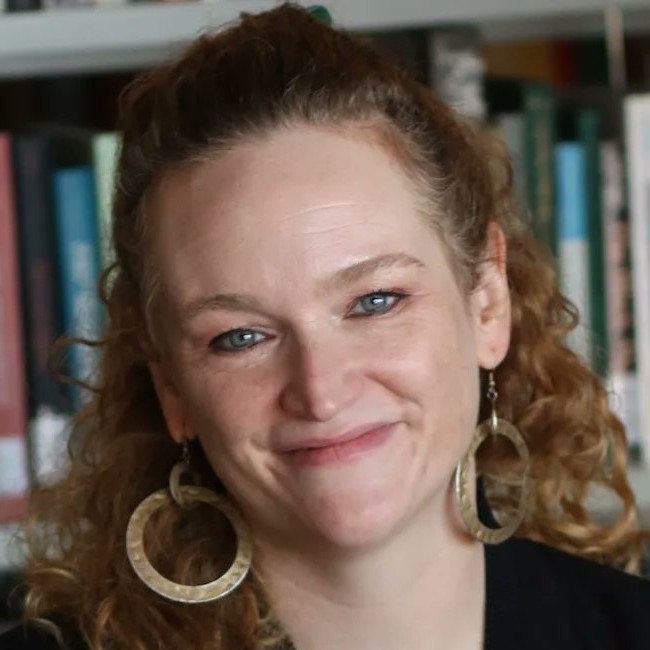New Member Feature
 Melissa Funke is assistant professor in the Department of Classics. She joined CRiCS in 2023 after contributing to the special issue of Global Media Journal -- Canadian Edition on "Memorial Reckoning and the Fall of Imperial Icons." Her work focuses on depictions of gender and sexuality in ancient Greek literature, fragmentary Greek literature, and the performance of drama in the ancient Mediterranean. Most recently she has been examining the classical legacy as expressed in early 20th-century architecture here in Winnipeg. Her book on the most famous sex worker in the ancient Greek world, Phryne: A Life in Fragments, will be published in Winter 2024.
Melissa Funke is assistant professor in the Department of Classics. She joined CRiCS in 2023 after contributing to the special issue of Global Media Journal -- Canadian Edition on "Memorial Reckoning and the Fall of Imperial Icons." Her work focuses on depictions of gender and sexuality in ancient Greek literature, fragmentary Greek literature, and the performance of drama in the ancient Mediterranean. Most recently she has been examining the classical legacy as expressed in early 20th-century architecture here in Winnipeg. Her book on the most famous sex worker in the ancient Greek world, Phryne: A Life in Fragments, will be published in Winter 2024.
Learn more about Melissa in the short interview below:
CRiCS: What brought you to academia and, more specifically, Cultural Studies?
Melissa: I have an interest in how different figures and artistic creations accrue cultural capital over time and how people have made use of that capital in different contexts. Within the context of ancient Greek and Roman culture, I became especially fascinated with figures like the hetairai, a group of female sex workers from Classical Greece that became cultural obsessions in their own lifetimes and then a representation of Classical Athens in later periods (the Hellenistic and Roman Imperial periods specifically). I have returned to this topic again and again since my masters but I find it such a fruitful topic that it is always worth reexamination. Nostalgia for past "glories" is something that has been part of Classical Studies since its inception and I am interested in how that has played out in the ancient and the modern world. Much of my work on classical reception in the modern world considers how the cachet of Greek and Roman culture is used to buttress existing power dynamics.
CRiCS: What are your areas of research interest?
Melissa: I work on gender and sexuality in ancient Greek literature and drama, the performance of ancient drama, and fragmentary Greek texts (among other topics).
CRiCS: Are there areas you would like to study or considered working on in the past, but probably won’t get to? Have you ended up doing research in an area that you didn’t expect to?
Melissa: I have always wanted to work on ancient Greek conceptions of so-called "barbarian" cultures, but so many other talented scholars are doing such excellent work on that topic already. One area that I have ventured into in the last few years is Chinese opera adaptations of Greek tragedy; I hadn't quite expected to be researching traditional Chinese opera costumes and makeup as part of my work in the Classics department!
CRiCS: What research projects are you currently working on or plan to work on in the future?
Melissa: I have just wrapped up a book project examining the biographical tradition of the most famous ancient Greek hetaira, Phryne. My next projects are a book on Chinese opera adaptations of Greek tragedy and some work on ancient mime, an informal comic genre of dramatic performance.
CRiCS: Why do you think it’s important to have intellectual community and the opportunities for research collaboration that CRiCS might offer?
Melissa: My best work is always done in collaboration with other scholars because of the richness that comes from sharing ideas and perspectives. With my growing interest in classical reception, I also look forward to hearing from scholars who work on the modern world.
CRiCS: What has been one of your most meaningful research encounters?
Melissa: I am part of the Ancient Love Letters research network, which has worked to define erotic letters from the ancient Mediterranean as their own genre of writing. Being exposed to the breadth of approaches to what seems like a narrow topic helped me see how even small contributions can shape broader scholarly conversations.
CRiCS: Has any particular book/film/work of art/etc. influenced your approach to your academic work and your perspective more generally?
Melissa: The fictional letters of the author Alciphron, who wrote in Greek under the Roman empire. They are all set in 4th-century Athens and give voice to characters that are typically secondary in other genres. Alciphron's work is highly detailed but also wryly nostalgic, so I think of him as the Wes Anderson of the ancient world. His work sparked my ongoing interest in cultural capital but is also a true delight to read.
CRiCS: What do you do in your free time (if you have any!)? Do you have any hobbies or pets?
Melissa: In the summer I am a gardener and pizza chef and in the winter a ringette player and sometime coach for my daughter's team. My dog, Rasputin, is my favorite research assistant.
